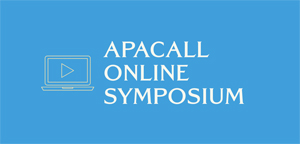The symposium is open to everyone (both members and non-members of APACALL). If you wish to present a paper at the symposium, you need to be an APACALL member first. Non-members are welcome to join APACALL (free membership) by completing and submitting a membership application form through the APACALL website.
[Call for Proposals]
APACALL invites proposals (consisting of a title of no more than 15 words and an abstract of 100-150 words each) for presentations related to CALL and TELT (15-minute Live Talk + 5-minute Q & A for each session). Potential presenters are asked to download and complete the Abstract Submission Form and then submit the completed form to the APACALL webmaster via email (webmaster@apacall.org) by 30 April 2024.
Proposals are encouraged within the sub-themes below, but are not limited to:
- Artificial intelligence (AI) in language learning and teaching
- Extended reality (XR) in language learning and teaching
- Machine translation in language learning and teaching
- Digital games in language learning and teaching
- Digital tools and resources for language learning and teaching
- Language learners and teachers in digital environments.
[Important Dates]
Proposal submission: 1 February - 30 April 2024
Proposal review: 1 - 31 May 2024
Presenter registration: 1 - 30 June 2024
Participant registration: 1 June - 30 September 2024
Symposium: Friday, 25 October 2024 (10:20 am - 6:10 pm AEST)
[Registration]
Free registration
Online from 1 June to 30 September 2024
[Program]
Full Program - Updated
[Invited Speakers]
|
Joy Egbert
|
Benefits and Caveats of AI Use for Language Teaching
|
|
Glenn Stockwell
|
Going Beyond the Hype: Teaching and Learning with AI Technologies
|
[Organisation]
Symposium Chair: Jeong-Bae Son
Symposium Co-Chair: Natasha Ruzic
Program Committee
Jeong-Bae Son (University of Southern Queensland, Australia)
Natasha Ruzic (Institute for Migration Research, Croatia)
Proposal Review Committee
Andrew Philpott (Kwansei Gakuin University, Japan)
Antonie Alm (University of Otago, New Zealand)
Made Hery Santosa (Universitas Pendidikan Ganesha, Indonesia)
Moonyoung Park (Jeju National University, Korea)
Edwina Bensal (De La Salle University-Manila, Philippines)
Ferit Kilickaya (Mehmet Akif Ersoy University, Turkey)
Junjie Gavin Wu (Macao Polytechnic University, China)
[Contact]
For more information, you can contact APACALL webmaster.
-- Sponsorship Package
[Sponsor]

